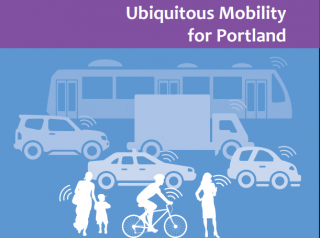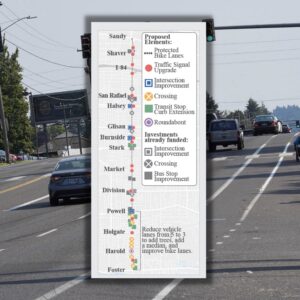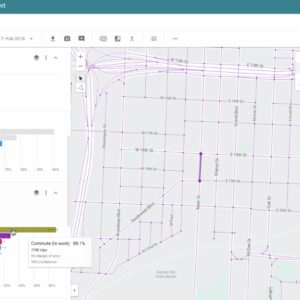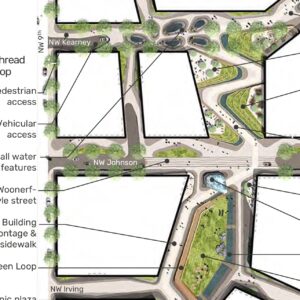“Ubiquitous mobility” is one step closer to reality in Portland.
On Saturday the U.S. Department of Transportation announced that the City of Portland has been selected as a finalist for a $40 million ‘Smart City Challenge’ grant. Portland’s big idea is known as “Ubiquitous Mobility” or UB Mobile PDX. The concept is to create access to our myriad transportation options that is so integrated that everyone can easily plug into it. The city says it will, “Show what is possible when communities use technology to connect transportation assets into an interactive network” and that it “puts forward bold, data-driven ideas to improve lives by making transportation safer, easier, and more reliable.”
Imagine opening up a mobile app to find (and pay for if necessary) the best trip option available for your specific needs. Whether it’s finding a Biketown bike, hopping on a TriMet bus, renting a bike through Spinlister, calling a Lyft driver, or whatever. The same app would also enable users to pay for parking spots and even the pay-per-mile gas tax that might someday be an option in Oregon. And that’s just the start. We took a deep dive into the city’s grant application last month.
77 cities applied for the grant and that list has been whittled down to seven. Portland is now competing with Austin, Kansas City, Pittsburgh, San Francisco, Denver, and Columbus (Ohio). U.S. Transportation Secretary Anthony Foxx made the announcement at the South by Southwest conference in Austin while on stage with several mayors including Portland’s Charlie Hales.
Advertisement
At SXSW Hales said, “Portland is uniquely positioned to be the prototyper in the USDOT Smart City Challenge, because we’ve been a prototyper for the nation. We will use this opportunity to invest in economic development, mobility, connectivity, and equity.”
As a finalist, Portland now receives $100,000 to further develop their idea. The USDOT says the winning city will be selected “based on their ability to think big, and provide a detailed roadmap on how they will integrate innovative technologies to prototype the future of transportation in their city.” The winner will be announced in June 2016.
Learn more at Transportation.gov/SmartCity.
— Jonathan Maus, (503) 706-8804 – jonathan@bikeportland.org
BikePortland can’t survive without subscribers. It’s just $10 per month and you can sign up in a few minutes.






“The concept is to create access to our myriad transportation options that is so integrated that everyone can easily plug into it.”
“Imagine opening up a mobile app to find (and pay for if necessary) the best trip option available for your specific needs.”
Already a fail. Unless there are expanded plans not mentioned in the article, the goal should really be restated: “The concept is to create access…that is so integrated that anyone with a smartphone and mobile data plan can easily plug into it.”
It will take several years to get this plan working. In that time, the 68% of people who currently have a smartphone (or whatever replaces them) may well rise close to 100.
El Biciclero… You’ll note that this is all speculation at this point since the plan isn’t final yet. Therefore I think it’s accurate to say that their aspiration is to create a tool that indeed everyone can use. Both myself and PBOT I’m sure is well aware of the issues and demographics surrounding access to technology. thanks.
I am probably being a little harsh saying “fail”, I just bristle a little at systems claiming to be accessible to “all”, that require smart phone use on the apparent assumption that “everybody” has one. I almost feel like smartphones are increasingly comparable to cars when it comes to system access: no smartphone, no access. But then, they don’t call it the “Information Superhighway” for nothing…
As access to “hard” systems becomes increasingly organized around and offered via “an app for your smartphone”, we have to be careful we aren’t leaving folks out. I compare this (loosely) to cars taking over the roads and becoming the most convenient mode of travel, to the detriment of other modes. As a fictitious example, let’s say Tri-Met decided that ticket machines were too much of a hassle to maintain at MAX stops, so all tickets had to be purchased either online, via an app for one’s smartphone, or in person at the downtown Pioneer Courthouse Square office during business hours. In this way, non-smartphone-users would be “accommodated”, but greatly inconvenienced, while those with a smartphone wouldn’t even notice.
Also exciting, yet unsettling is this quote from one of the fictitious characters in the grant application (as presented in the “deep dive” linked from the main article above):
Will pedestrian fatalities only end for those who have the good sense to “be seen” by carrying their smartphone and activating its trackable GPS functions so it can alert the on-board systems of a car or the smartphone of the driver (or the police, or a stalker, or an employer, or the NSA…) to warn them the pedestrian is there? At least it says, “first step”.
I’m being extreme and paranoid on purpose, here, but I would hate to see faulty assumptions lead us somewhere we don’t want to go.
I think you and I agree with each other on principle. And to be clear, I’m not defending the project. I was just trying to clarify a few points.
Maybe some research on the tool would help:
http://www.pewinternet.org/2015/04/01/chapter-one-a-portrait-of-smartphone-ownership/
The best solution is getting everyone a smartphone.
Seems to me this is more or less what Google already does, plus a few links to direct a person to Trimet, Uber, BikeShare, etc. Too bad the grant isn’t for something more tangible.
This program is nothing but pork-barrel spending wrapped in new imagery. Some of the wealthiest entities on earth are tech companies. They have no need for handouts while people go homeless and jobless.
While not exactly the topic of this grant, we are on the precipice of massive and irreplaceable job losses as a result of automation in transportation which will affect not just operators but the entire transportation and logistics industry end-to-end.
Like NAFTA 2.0 but this time self-imposed.